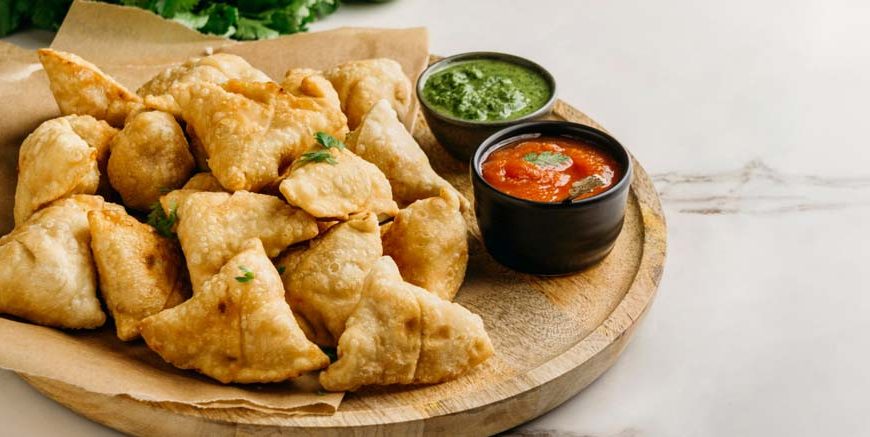Monsoon is a magical time in India. The rains provide a relief from the scorching summer sun and turn everything into a sea of green. Dancing on the streets to the drops of rain, craving for all that piping hot street food. Walking in the rain… and the desire to reach out to a stall selling crispy pakoras and spicy chaat, while holding onto your child’s hand. Mmm, and you can smell it, prompting your child to a shameless hand tug…just one again. But there is a thing to consider and that is, Monsoon season street food has risks and a lot of which can land you in hospital premises. This blog will be spreading light on why street food should be avoided in monsoon seasons and will be giving you the Monsoon Diet Tips to care for your family safe and healthy.
The Allure of Street Food
In India, street food is a base for Indian culture. From Spicy Chaat to Crispy Pakoras and lip-smacking Samosas, these delights are impossible to resist. These treats are whipped up to perfection by street vendors and the smell bubbling through the air will doubtlessly make your tummy grumble. However, during the monsoon, eating street food may give you an infection in your stomach or some chronic disease.
Why is street food in the monsoon a NO GO?
Here is a list of reasons why to avoid street food in monsoon:
- Risk of cross-contamination is higher
- Stomach Infections
- Waterborne Diseases
- Semi-Cooked Food
- Inadequate Storage
- Pest Infestation
The rains deposit a lot of pollutants. Water lodges in the streets and open drains are the breeding ground for bacterias and viruses. It is difficult to maintain the cleanliness with the street vendors working in these unhygienic conditions. While contaminated water is one common reason for stomach infection, the other one is semi-cooked food.
There’s a high level risk of stomach infection during the monsoon. Food, for example, is more prone to carry in dangerous bacteria such as E. coli and Salmonella when it gets rained on, or is exposed to high humidity. This can result in gastroenteritis, which typically causes mild to severe diarrhoea, nausea, vomiting, and abdominal pain.
Monsoons often are accompanied by water-borne diseases like cholera, typhoid and hepatitis A which come from consumption of contaminated water and food. Street vendors are known to use water from what is essentially a murky source for cooking and washing utensils. This increases the risk of buying adulterated food that can cause serious health problems.
Street food usually made to be stockpiled in advance is reheated for serving. Food which is cooked only to a certain extent during monsoon is even more harmful, as it encourages the growth of bacteria due to the favourable climatic conditions. Eating that food can result in food poisoning as well as other digestion issues. The key is to ensure the food is well-prepared to kill off any unwanted germs.
Store Food Properly: This is necessary to avoid spoilage and contamination. Perhaps street vendors have totally unreliable systems of refrigeration, so that refrigeration is all but impossible: perishables go off within hours of being sold. During monsoon, this issue is increased due to the high levels of humidity. The eating of rotten items can cause bad stomach infections and food poisoning.
Before entering Monsoon season the growth of pests like flies, mosquitoes, and rodents too becomes more prominent. They are common around food and contaminants. Sellers who are working on the street in unworthy sanitary conditions will be more exposed to an infestation of pests. With a no-street food diet in monsoon, you can save your healthy self and your family from diseases spread by these germs.
Now you know why to avoid street food at all costs during the monsoons 🙂
Monsoon Diet Tips for Parents
Earlier, we understood that eating street food during the monsoon is not good for us. Here are some tips to keep yourself safe during the monsoon season:
- Cook at Home
- Stay Hydrated
- Carefully Wash Fruits and Vegetables
- Stay Clear of Uncooked or Undercooked Foods
- Maintain Hygiene
It is safest to prepare the food at home, especially during the monsoon, to maintain hygiene and safety of the same. All meals will be cooked in the traditional way in order to kill the bacteria, and only fresh food shall be used. In addition to providing better nutrition home-cooked meals, it also lessens the threat of a tummy infection. Try new recipes to keep home-cooked meals interesting for your children.
It is very important to drink clean and safe water in the rain. Make sure your family drinks only boiled or filtered water with effective water purifiers from Kolkata in order to protect themselves from the innumerable waterborne diseases. Also, include herbal teas and fresh fruit juices to maintain hydration. Slice some lemon, fresh mint will help your kids drink more water.
Wash fruits and vegetables properly under running water right before cooking. If you are worried about some remaining pollutants, soak them in some salt water for a couple of minutes.
Do not eat raw Salads, Fruits and Semi-cooked food during monsoon season. Stick to meats that are cooked well or are warm so that bacteria cannot survive. Street food should be avoided in monsoon and consumption of home-cooked food is preferable. Opt for warm soups and stews that can be comforting and safe to eat.
Make sure your entire family washes their hands well before eating. Personal hygiene is another important aspect because it helps in the spread of the infection. Tell them about the need for washing and keeping the place around them clean.
Here at EuroKids, we know how important nutrition is for your child. Part of our curriculum also involves creating good eating habits and a mindset for cleanliness amongst the kids. We offer growing minds and bodies to help young people become healthy and happy people. And to know more about EuroKids, students’ well-being and our programs, click here.
Conclusion
Certainly, there is a strong urge to catch up on street food especially in monsoons, and one cannot resist, but it is preferable to stay away from street foods in such a season due to some health risks. The entire family can ensure safety and health if dining out during monsoons is avoided and you follow the Monsoon Diet Tips well and prepare meals at home. So it is always better to take some precautions to avoid stomach infections and other official diseases. Munch on snacks keeping a healthy spin on the process of enjoying the rains and having fun in safe and sound food.
Stay safe, stay healthy, and enjoy the monsoon with loved ones!
















